
Uses primary
- Subject:
- History
- Material Type:
- Lesson
- Provider:
- Connecticut Humanities
- Provider Set:
- Teach It
- Date Added:
- 02/09/2023

Uses primary
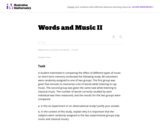
The purpose of this task is to assess (1) ability to distinguish between an observational study and an experiment and (2) understanding of the role of raandom assingment to experimental groups in an experiment.
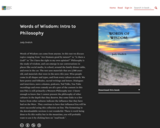
Words of Wisdom can come from anyone. In this text we discuss topics ranging from "Are Humans good by nature?" to "Is there a God?" to "Do I have the right to my own opinion?" Philosophy is the study of wisdom, and can emerge in our conversations in places like social media, in school, around the family dinner table, and even in the car. The text uses materials that are 2,500 years old, and materials that were in the news this year. Wise people come in all shapes and types, and from every culture on earth. We have poetry and folktales, sacred writings and letters. Dialogues and interviews, news columns, podcasts, Ted Talks, You Tube recordings and even comedy are all a part of the content in this text.You will be most successful using this collection this on line.
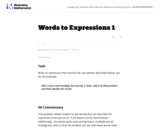
This problem allows students to see words that can describe the expression. Additionally , the words (add, sum) and (product, multiply) are all strategically used so that the student can see that these words have related meanings.
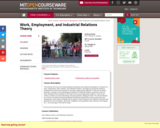
Historical evolution and assessment of different theories and disciplinary perspectives used in research on work, employment, and industrial relations. Introduces doctoral students to the field and explores where their research interests fit within the broader field. First part compares the normative assumptions, theories, and methodologies used by economists, historians, sociologists, psychologists, political scientists, and legal scholars from the latter nineteenth century to the present. Final portion explores strategies for advancing research on topics of current interest to participants.
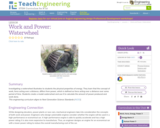
Investigating a waterwheel illustrates to students the physical properties of energy. They learn that the concept of work, force acting over a distance, differs from power, which is defined as force acting over a distance over some period of time. Students create a model waterwheel and use it to calculate the amount of power produced and work done.
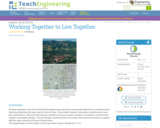
Students experience civil and environmental engineering by planning a housing development in an existing biome, while also protecting the native species that live there. They conduct research, draw plans, make brochures and give presentations, with each team having a member serving as a project manager, civil engineer, environmental engineer and graphic designer. The best designs creatively balance the needs and resources necessary to support both the native species and human infrastructure.
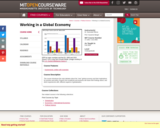
The course introduces the main debates about the "new" global economy and their implications for practice and policy. Experts from academia and business will share their findings about, and direct experiences with, different aspects of globalization.

A Khan Academy module that offers instruction and practice problems in exponents and scientific notation.
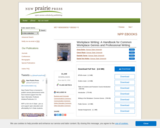
This handbook is designed for a generalized business writing course that seeks to meet the needs of a variety of student majors and career interests. In it you will find: descriptions and discussions of common genres, both routine and formal, print and electronic, and in-class activities and sample assignments. You will also find commentary on how to adapt the writing process to the rhetorical constraints of a workplace as well as how to think about, conduct, and use research outside an academic setting. Throughout you will note a persistent emphasis on audience awareness and direct style.
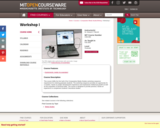
Provides an opportunity for a hands-on project development experience and emphasizes intellectual growth as well as the acquisition of technical skills. Students attend regular meetings to present and critique their work and discuss its implications. This course fulfills the first half of the Comparative Media Studies workshop sequence requirement for entering graduate students. The workshop sequence provides an opportunity for a creative, hands-on project development experience and emphasizes intellectual growth as well as the acquisition of technical skills. The course is designed to provide practical, hands-on experience to complement students' theoretical studies.
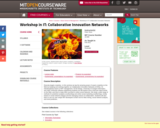
Diversity begets creativity - in this seminar we tap the amazing power of swarm creativity on the Web by studying and working together as Collaborative Innovation Networks (COINs). As interdisciplinary teams of MIT management, SCAD design, University of Cologne informatics, and Aalto University software engineering students we will explore how to discover latest trends on the Web, and how to make them succeed in online social networks. We study a wide range of methods for predictive analytics (coolhunting) and online social marketing (coolfarming), mostly based on social network analysis and the emerging science of collaboration. Students will also learn to use our own unique MIT-developed Condor tool for Web mining, social network analysis, and trend prediction.
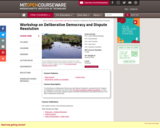
The Workshop on Deliberative Democracy and Dispute Resolution,sponsored by the Program on Negotiation at Harvard Law School and the Flora and William Hewlett Foundation, is a two-day conference that brings together dispute resolution professionals and political theorists in the field of deliberative democracy.
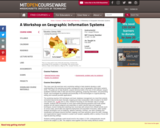
This class uses lab exercises and a workshop setting to help students develop a solid understanding of the planning and public management uses of geographic information systems (GIS). The goals are to help students: acquire technical skills in the use of GIS software; acquire qualitative methods skills in data and document gathering, analyzing information, and presenting results; and investigate the potential and practicality of GIS technologies in a typical planning setting and evaluate possible applications. The workshop teaches GIS techniques and basic database management at a level that extends somewhat beyond the basic thematic mapping and data manipulation skills included in the MCP core classes (viz. 11.204 and 11.220). Instead of focusing on one thematic map of a single variable, students will concentrate on more open-ended planning questions that invite spatial analysis but will require judgment and exploration to select relevant data and mapping techniques; involve mixing and matching new, local data with extracts from official records (such as census data, parcel data and regional employment and population forecasts); utilize spatial analysis techniques such as buffering, address matching, overlays; use other modeling and visualization techniques beyond thematic mapping; and raise questions about the skills, strategy, and organizational support needed to sustain such analytic capability within a variety of local and regional planning settings. Students seeking graduate credit should enroll in the subject 11.520; undergraduates should enroll in the subject 11.188. The subjects meet together and have nearly identical content. ArcGIS/ArcMap/ArcInfo Graphical User Interface is the intellectual property of ESRI and is used herein with permission. Copyright ĺŠ ESRI. All rights reserved.
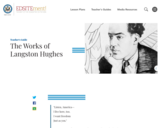
Since 1995, Rhode Islanders have come together each February to read and celebrate the life of one of America's finest poets and writers, Langston Hughes (1902-1967). Made possible through a grant from the Rhode Island Council for the Humanities, an independent state affiliate of the National Endowment for the Humanities, the annual Langston Hughes Poetry Reading is a shining example of what public humanities can pass on to communities far and wide. In addition to videos of readings given by participants at the annual event, this page includes resources and related materials for teaching about Langston Hughes.
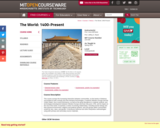
This course surveys the increasing interaction between communities, as the barrier of distance succumbed to both curiosity and new transport technologies. It explores Western Europe and the United States' rise to world dominance, as well as the great divergence in material, political, and technological development between Western Europe and East Asia post–1750, and its impact on the rest of the world. It examines a series of evolving relationships, including human beings and their physical environment; religious and political systems; and sub-groups within communities, sorted by race, class, and gender. It introduces historical and other interpretive methodologies using both primary and secondary source materials.
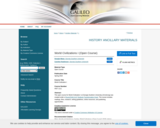
This open course for World Civilization I at Georgia Southern University (Armstrong) was created under a Round Eight ALG Textbook Transformation Grant. The course includes readings, films, research, writing guidelines, online resources, and publishing opportunities.
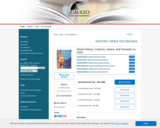
World History: Cultures, States, and Societies to 1500 offers a comprehensive introduction to the history of humankind from prehistory to 1500. Authored by six USG faculty members with advance degrees in History, this textbook offers up-to-date original scholarship. It covers such cultures, states, and societies as Ancient Mesopotamia, Ancient Israel, Dynastic Egypt, India’s Classical Age, the Dynasties of China, Archaic Greece, the Roman Empire, Islam, Medieval Africa, the Americas, and the Khanates of Central Asia.
It includes 350 high-quality images and maps, chronologies, and learning questions to help guide student learning. Its digital nature allows students to follow links to applicable sources and videos, expanding their educational experience beyond the textbook. It provides a new and free alternative to traditional textbooks, making World History an invaluable resource in our modern age of technology and advancement.
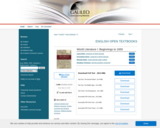
This peer-reviewed World Literature I anthology includes introductory text and images before each series of readings. Sections of the text are divided by time period in three parts: the Ancient World, Middle Ages, and Renaissance, and then divided into chapters by location.
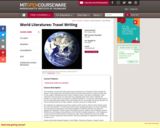
This semester, we will read writing about travel and place from Columbus's Diario through the present. Travel writing has some special features that will shape both the content and the work for this subject: reflecting the point of view, narrative choices, and style of individuals, it also responds to the pressures of a real world only marginally under their control. Whether the traveler is a curious tourist, the leader of a national expedition, or a starving, half-naked survivor, the encounter with place shapes what travel writing can be. Accordingly, we will pay attention not only to narrative texts but to maps, objects, archives, and facts of various kinds. Our materials are organized around three regions: North America, Africa and the Atlantic world, the Arctic and Antarctic. The historical scope of these readings will allow us to know something not only about the experiences and writing strategies of individual travelers, but about the progressive integration of these regions into global economic, political, and knowledge systems. Whether we are looking at the production of an Inuit film for global audiences, or the mapping of a route across the North American continent by water, these materials do more than simply record or narrate experiences and territories: they also participate in shaping the world and what it means to us. Authors will include Olaudah Equiano, Caryl Philips, Claude L?vi-Strauss, Joseph Conrad, Jamaica Kincaid, William Least Heat Moon, Louise Erdrich, ?lvar N Brazil|Caribbean|Coetzee|Columbus|Culture|Defoe|De Lery|Drama|Essay|Ethnicity|Europe|Film|French|History|Literature|Modern|Montaigne|Narrative|North America|Novel|Poetry|Religion|Report|Rowlandson|Travel|Walcott|William Shakespeare|Writing en http://creativecommons.org/licenses/by-nc-sa/3.0/ Creative Commons Attribution-NonCommercial-ShareAlike 3.0 Creative Commons Attribution-NonCommercial-ShareAlike 3.0 remix-and-share student| Visual|Textual Curriculum/Instruction|Professional Development published 2 200
32873 learning-from-the-past-drama-science-performance-spring-2009 21L.016Spring2009 2010-10-07T04:39:16 Learning from the Past: Drama, Science, Performance, Spring 2009 1/1/2009 Henderson, Diana|Sonenberg, Janet | | M.I.T. M.I.T.:M.I.T. OpenCourseWare https://www.oercommons.org/courses/learning-from-the-past-drama-science-performance-spring-2009 https://ocw.mit.edu/courses/literature/21l-016-learning-from-the-past-drama-science-performance-spring-2009/ Arts and Humanities|Performing Arts|Philosophy|Religious Studies|World Cultures|Astronomy|Chemistry|Physics Full Course Downloadable docs|Text/HTML Post-secondary This class explores the creation (and creativity) of the modern scientific and cultural world through study of western Europe in the 17th century, the age of Descartes and Newton, Shakespeare, Milton and Ford. It compares period thinking to present-day debates about the scientific method, art, religion, and society. This team-taught, interdisciplinary subject draws on a wide range of literary, dramatic, historical, and scientific texts and images, and involves theatrical experimentation as well as reading, writing, researching and conversing. The primary theme of the class is to explore how England in the mid-seventeenth century became "a world turned upside down" by the new ideas and upheavals in religion, politics, and philosophy, ideas that would shape our modern world. Paying special attention to the "theatricality" of the new models and perspectives afforded by scientific experimentation, the class will read plays by Shakespeare, Tate, Brecht, Ford, Churchill, and Kushner, as well as primary and secondary texts from a wide range of disciplines. Students will also compose and perform in scenes based on that material."